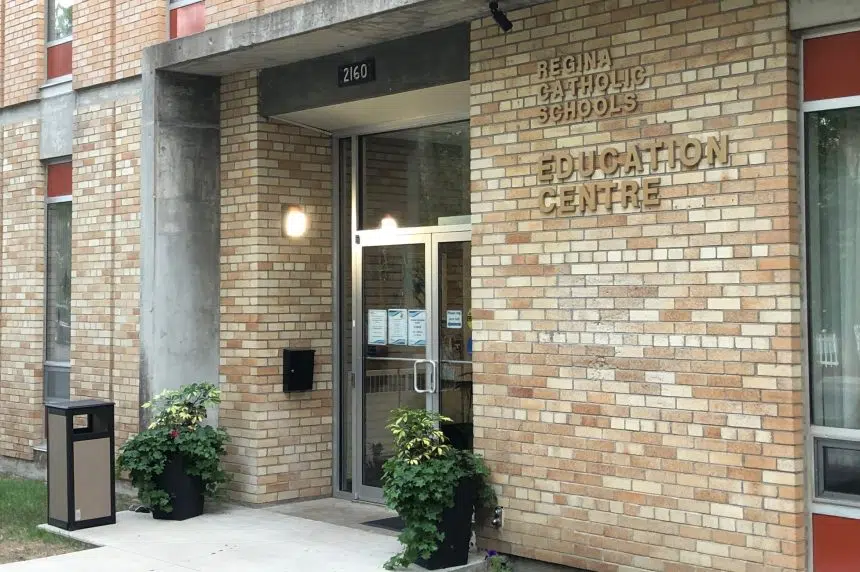A week after Education Minister Dustin Duncan’s announcement and a week away from classes starting again, many school divisions in the province are still trying to figure out how to deal with the new policies around pronouns and sex ed.
The policies were announced last week, creating consistency between all the divisions, Duncan said at the time.
The biggest school divisions in the province’s two biggest cities are all still working through the announcements and what they’re going to mean for them.
Saskatoon Public Schools, Greater Saskatoon Catholic Schools and Regina Public Schools all declined requests for interviews as they’re still working to understand the policies and the implications for their divisions. Sean Chase, the CEO and director of education for the Regina Catholic School Division, did agree to an interview.
“We are just starting to unpackage it right now and doing our best in this time frame to have something ready for the beginning of the school year,” Chase said.
Like the other three major divisions, Chase said his division only heard about the policy changes when they were announced publicly. He said Regina Catholic is reviewing the information and how to put the policies in place alongside the existing practices in the division.
One of the three new policies is requiring that if a student under 16 wants to change their name and pronouns formally or informally at school, staff will have to get permission from the student’s parents.
Chase said the division didn’t have any policies around those things previously, but had been working collaborating with the Catholic Archdiocese and other Catholic divisions in the province.
“One of the things that we value – I think all school divisions value – is the importance of the discretion and the work of our professionals in schools and classrooms to be supportive of students,” explained Chase.
“When we speak to something as complex as human sexuality and gender and sexual diversity, one of the key pieces that we land on is that this really needs to be work done on a case-by-case basis for individuals, just like we do individualized academic programming and individualized programming for students.”
He said the division is now working on the logistics of the province’s new policies and how to incorporate them in a way that keeps the students in mind, as well as the concept of safer spaces and the Catholic faith.
The other two policies involve sexual health education. Chase said in the Regina Catholic School Division parents are already told when sex ed is going to take place and can take their children out of the class if they wish.
“We’ve always looked to have the parents and the families as partners in the educational journey for all aspects but especially in a topic as sensitive as this,” said Chase.
The Education Ministry is also now banning third-parties from presenting sex ed classes except for experts from the Ministry of Health or the Saskatchewan Health Authority. However, Chase said the division has regularly had subject matter experts from the Catholic Archdiocese or other Catholic partners in to talk to sex ed classes — and he said that will be among the questions the division will have to ask the ministry.
Chase wasn’t willing to say whether the new policies will be good or bad, saying it’s too soon.
“This has brought forward a lot of emotion from people wherever they land on it and highlighting the conversation. If it leads us to a place of looking out for our kids and ensuring that they are feeling loved and dignified and faith in our schools, if that becomes the end result, then I think that’s a good thing. But right now it’s certainly, perhaps, a polarizing and emotional conversation,” said Chase.
Other division procedures
Saskatoon Public Schools doesn’t have any current policies or administrative procedures around student pronoun or name changes.
When asked, it pointed to the division policy on human rights, which cites the UN Convention on the Rights of the Child, among other documents, and talks about diversity, respect and no tolerance for discrimination.
Saskatoon Public Schools also said it uses the Ministry of Education’s own document called “Deepening the Discussion: Gender and Sexual Diversity 2023.”
It doesn’t specifically talk about pronouns or chosen names for students in school, but does cite statistics showing gender and sexually diverse people see higher rates of anxiety, harassment and discrimination, and said education systems need to support these students.
“Feeling ostracized and isolated in schools has long-term negative impacts on one’s physical and emotional well-being. When students feel threatened, they may try to escape these negative environments through unhealthy behaviours,” reads the document.
Regina Public does have a policy, also known as an administrative procedure, around gender and sexual diversity.
The policy sets out a commitment to a “safe, inclusive, equitable, and welcoming environment” for everyone in the school community.
It said the division believes students and their families have the right to have their privacy protected and respected, and the right to self-identification and self-determination.
In the section on privacy and confidentiality, the policy says students are to be referred to as their preferred name and pronouns, including on staff lists and student files where possible — though official records will only be changed when there’s a legal name change.
“Once a student declares their pronouns they must be respected to ensure the student’s sense of well-being and security,” reads the document.
It also says staff will respect the confidentiality and privacy of a student’s sexual orientation, gender identity or expression unless the student has given permission, or if there’s an impending safety concern.
Greater Saskatoon Catholic Schools didn’t volunteer any present policies or procedures that might exist around student pronoun or name changes.











